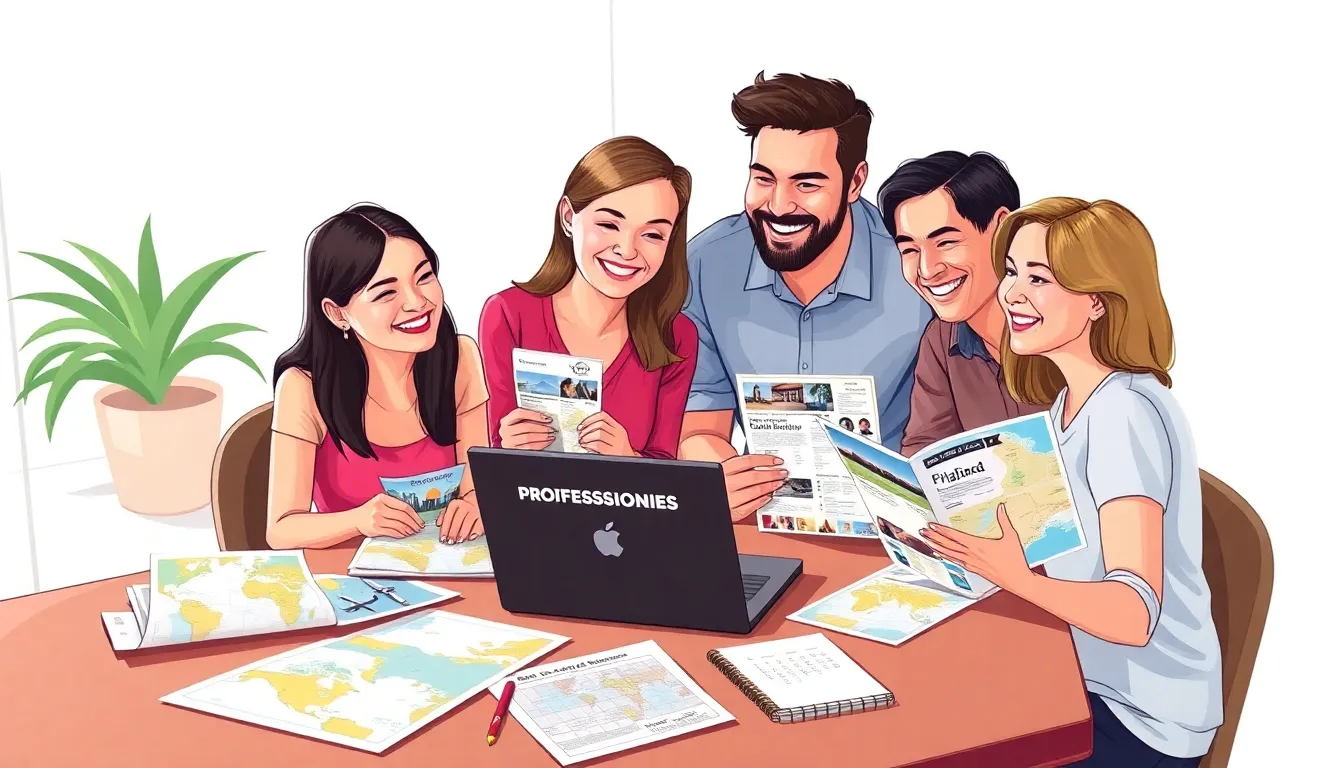Table of Contents
TogglePlanning a vacation can feel like trying to solve a Rubik’s Cube blindfolded—exciting yet utterly confusing. With countless destinations, activities, and budgets to juggle, it’s easy to get overwhelmed. But fear not! This vacation planning guide is here to transform your travel dreams into reality without the headache.
Importance Of A Vacation Planning Guide
A vacation planning guide provides structure and clarity during the trip preparation process. By outlining essential steps, it streamlines decision-making, reducing stress. Many travelers feel overwhelmed by choices; a guide helps prioritize preferences and manage time effectively.
Budget management plays a crucial role in planning. Establishing a clear financial outline prevents overspending, allowing travelers to allocate funds more efficiently. With a consistent budget, individuals gain peace of mind, knowing their finances are controlled.
Destination selection becomes easier through research and comparison. A planning guide highlights various locations, activities, and accommodations, enabling travelers to make informed decisions. Exploring options fosters excitement, increasing anticipation for upcoming adventures.
Organization is another significant aspect of vacation planning. Coordinating itineraries, transportation, and bookings in one place prevents last-minute scrambles and forgotten details. A well-organized plan leads to smoother travel experiences and increased enjoyment.
Traveler preferences shape favorite activities; a guide addresses these interests. Whether someone seeks relaxation, adventure, or cultural experiences, it curates an itinerary that caters to diverse tastes. This personalized approach enhances overall satisfaction during the trip.
Lastly, a planning guide fosters flexibility. Unexpected situations can arise, and having a plan allows for easier adjustments without losing sight of the main goals. Anticipating potential changes ensures travelers remain adaptable, making the most out of every opportunity.
Setting A Budget

Setting a budget ensures a smooth vacation experience and helps manage expenses effectively.
Estimating Costs
Start by identifying main expenses, including transportation, accommodation, activities, and food. Research estimates for flights to the destination, comparing prices from various airlines. Accommodation often represents a significant portion of the budget; check online platforms for competitive rates. Activities should also be considered; admission fees for attractions can vary widely. Allocate around $50 to $100 per person daily for meals, depending on dining preferences. Keeping a detailed spreadsheet can assist in tracking these costs and ensuring they don’t exceed the budget.
Saving Tips
Finding ways to save money enhances the overall vacation experience. Consider booking flights early for lower prices, as last-minute deals are rarely available. Opt for off-peak travel to maximize savings; vacationing during less popular seasons can significantly reduce costs. Utilize rewards points from credit cards for discounts on flights and hotels. Additionally, consider cooking some meals instead of dining out, which can lower daily expenses. Daily budgeting and monitoring spending during the trip can help maintain financial discipline.
Choosing A Destination
Selecting a destination sets the stage for an enjoyable trip. The right choice impacts overall satisfaction and the experiences throughout the vacation.
Researching Destinations
Exploring potential locations involves gathering information that aligns with preferences. Start by assessing activities available at each destination. Look for attractions, local culture, and dining options. Utilize online resources, such as travel blogs and aggregators, to gather recent traveler reviews. Compare different destinations based on budget, accessibility, and accommodation options. If travelers prioritize adventure, locations with outdoor activities might catch attention. Alternatively, those interested in relaxation may prefer beach or spa destinations.
Weather Considerations
Understanding local weather patterns affects trip enjoyment significantly. Seasonal variations can impact activities and overall experience. Research average temperatures, rainfall, and peak tourist seasons. For example, tropical destinations experience wet seasons that can alter plans. When traveling to colder areas, travelers must prepare for snow or frost. If it’s a summer trip, selecting a location with mild temperatures lessens discomfort. A well-timed visit ensures participation in local events like festivals or nature activities, enhancing the overall experience.
Creating An Itinerary
Creating an itinerary makes planning a vacation manageable and enjoyable. It provides structure while allowing for flexibility throughout the trip.
Daily Activities
Daily activities form the core of an itinerary. Prioritize must-visit attractions, exploring local landmarks, and engaging in unique experiences. Include specific timeframes for sightseeing, dining, and leisure activities. Adjust plans based on opening hours and transportation. Mix popular sites with hidden gems to ensure a well-rounded experience. Documenting reservations for activities, like tours or events, prevents confusion on scheduling. Balance free time with organized activities to accommodate spontaneous adventures.
Balancing Relaxation And Exploration
Balancing relaxation and exploration enhances overall trip satisfaction. Plan downtime between busy sightseeing days to avoid fatigue. Incorporate leisurely activities, such as visiting parks or cafes, into the schedule. This provides recovery time and allows travelers to absorb their surroundings. Set aside quiet evenings after full days to enjoy local cuisine and culture. Prioritize activities based on personal preferences to create a harmonious blend between adventure and tranquility. Emphasizing balance maximizes enjoyment while exploring new places.
Booking Accommodations
Choosing the right accommodations significantly influences overall vacation enjoyment. Selecting options that align with traveler preferences creates a comfortable base for adventures.
Types Of Accommodations
Hotels provide a full range of amenities and services, catering to diverse budgets. Motels offer more economical choices near highways, perfect for quick stops. Vacation rentals like Airbnb enable personalized experiences and home-like comforts. Hostels attract budget travelers, offering shared spaces and social opportunities. Resorts combine luxury with leisure, often featuring all-inclusive packages for seamless experiences.
Factors To Consider
Location stands out as a crucial consideration. Proximity to attractions impacts convenience and travel time. Budget affects options available; determining costs early prevents overspending. Amenities matter, as necessities like Wi-Fi and pools enhance comfort. Reviews offer insights into quality and service, guiding informed decisions. Accessibility features ensure travelers with disabilities enjoy a comfortable stay.
Planning a vacation doesn’t have to be daunting. With a structured approach and thoughtful organization, travelers can transform their dream trips into reality. By managing budgets effectively and selecting destinations that align with personal preferences, they can enhance their overall experience.
Creating a balanced itinerary allows for both exploration and relaxation, ensuring that every moment is enjoyable. Taking the time to research accommodations and activities can lead to unforgettable memories. Flexibility remains key, enabling travelers to adapt to changes while keeping their goals in sight. With these strategies in hand, anyone can embark on a memorable adventure filled with joy and discovery.




